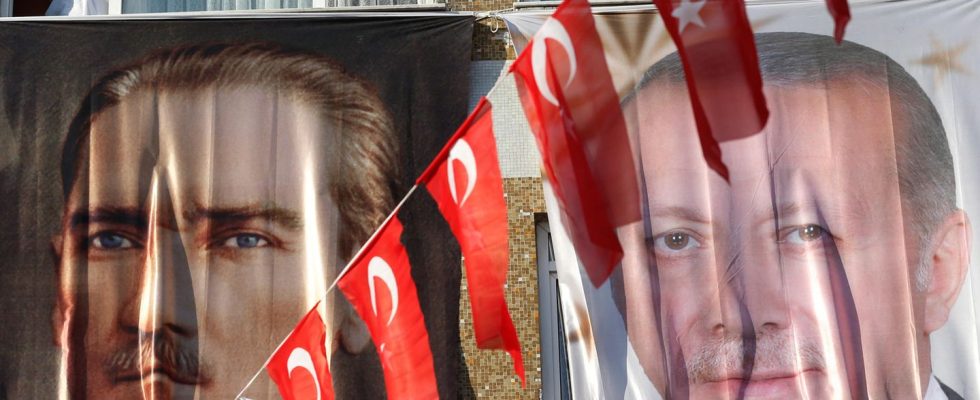Ataturk’s legacy
100 years of Turkey: “Nobody has shaped the country like Erdogan since Atatürk”
A woman looks out of a window behind a banner of the Turkish state founder Ataturk (l) and the Turkish President Erdogan (r.)
© Lefteris Pitarakis / AP / DPA
In 1923, Kemal Ataturk proclaimed the Turkish Republic. A hundred years later, the man is still honored in Turkey – although not by President Recep Tayyip Erdogan. He is keeping away from the progress of his predecessor – even if his party owes a lot to Atatürk.
When the proclamation of the Turkish Republic marks the 100th anniversary on Sunday, one person in particular may not feel like celebrating. Because with President Recep Tayyip Erdogan there is a man at the head of the 1923 Kemal Ataturk founded the state, which wants to steer the country in a completely different direction than its founding father. Sometimes with success.
Turkey was founded after the end of the Ottoman Empire. Atatürk gave the country a change from above in an authoritarian manner: the new Turkey should not be in the tradition of the Ottomans, but should be oriented towards the West and modern. In the 1930s, women were given the right to vote and stand for election; the Latin alphabet was now to be used instead of Arabic, and the so-called hat law banned turbans and fez. In Istanbul you should wear what was also worn in major Western European cities.
The personality cult surrounding Atatürk is still alive today: the image of the first president can be found on walls in offices, restaurants and living rooms, his signature is emblazoned on cars and as a tattoo on the skin of compatriots. But Atatürk’s legacy is controversial. Not only members of minorities in the country as well as parts of the Kurdish population see the founder of the state as an oppressor. The strictly secular course he characterized – i.e. the clear separation of religion and state – did not please everyone in the predominantly Muslim country. Religion was relegated to the private sphere. This also explains Erdogan’s rise.
Erdogan is reversing Türkiye’s secularization
Instead of following the tradition of the founder of the state, he places himself in the tradition of the Ottomans, presents himself as the protector of Muslims worldwide and reactivates the Pan-Turkism abandoned by Atatürk, the myth of a connection between all Turkic peoples. It is above all Erdogan who is bringing religion back into politics, lifting the headscarf ban in public institutions and strengthening the religious authority.
While the AKP made politics for a broader society at the beginning of its government in 2002, today it is the mouthpiece of a very specific population group. “The AKP only represents its own electorate – the strictly Muslim conservative part of the population – the Turkish nation,” write political scientists Günter Seufert and Christopher Kubaseck in their book “Farewell to Atatürk.” This presents the country with a breaking point because the country’s religious, ethnic and cultural diversity is being negated.
Erdogan’s supporters tell a different story. Many have only felt free since the conservative Muslims came to power. Özlem Zengin, for example, AKP MP and party member from the very beginning, pushed the headscarf ban into politics. In an interview, she explains the “search for freedom” and the “pursuit of justice” as her greatest motivation. The lawyer says that the laws on wearing the headscarf prevented her from doing her job at the time. Now, like many other women, she sits in parliament wearing a headscarf.
Erdogan is jealous of his predecessor
The fact that these statements are based on only a limited definition of freedom is also reflected in the AKP government’s tough actions against its critics. Erdogan relies on a friend-enemy scheme to ensure the approval of the population: gay, lesbian and queer people, the opposition, terrorists – Erdogan rhetorically conflates them into a supposed opponent who stands opposite the pious Turks. The European Union has been attesting that the country has been taking significant steps backwards in terms of democracy, the rule of law, fundamental rights and the independence of the judiciary for years, and the accession negotiations are therefore on hold. This year’s report from the EU Commission must also be expected to record further steps backwards, said the EU ambassador to Turkey, Nikolaus Meyer-Landrut, to the German Press Agency.
“No one has shaped Turkey after Atatürk like Erdogan,” says Berk Esen, a political scientist at Sabanci University in Istanbul. Nevertheless, the current head of state looks at Atatürk with envy. Instead of a 100th anniversary, Erdogan would probably rather “create a second founding of the republic, but with completely different characteristics – much more conservative, closer to the states of the Middle East, more authoritarian and reactionary.”
“Atatürk wasn’t a democrat either”
Erdogan himself also benefits from the legacy of Kemal Atatürk’s so-called Kemalism. What’s more, without Atatürk, Erdogan “would never have become president,” says Esen. After all, today’s head of state comes from a lower middle class family – and Atatürk created the conditions for their social advancement.
The AKP has also inherited institutions whose strength also goes back to Atatürk, says Esen: “Turkey has a strong bureaucracy that Erdogan has used to implement his agenda.” The country’s democratic institutions have been undermined for years. The judiciary and the media are largely subordinate to the government, the economy and society are characterized by clientelism and nepotism, write Seufert and Kubaseck.
“Atatürk was anything but a democrat. (…) The fact that Turkey is saying goodbye to him after a hundred years could also be a positive sign,” write the political scientists. “The fact that this farewell to the rule of a new strong man is happening is not good news.”

